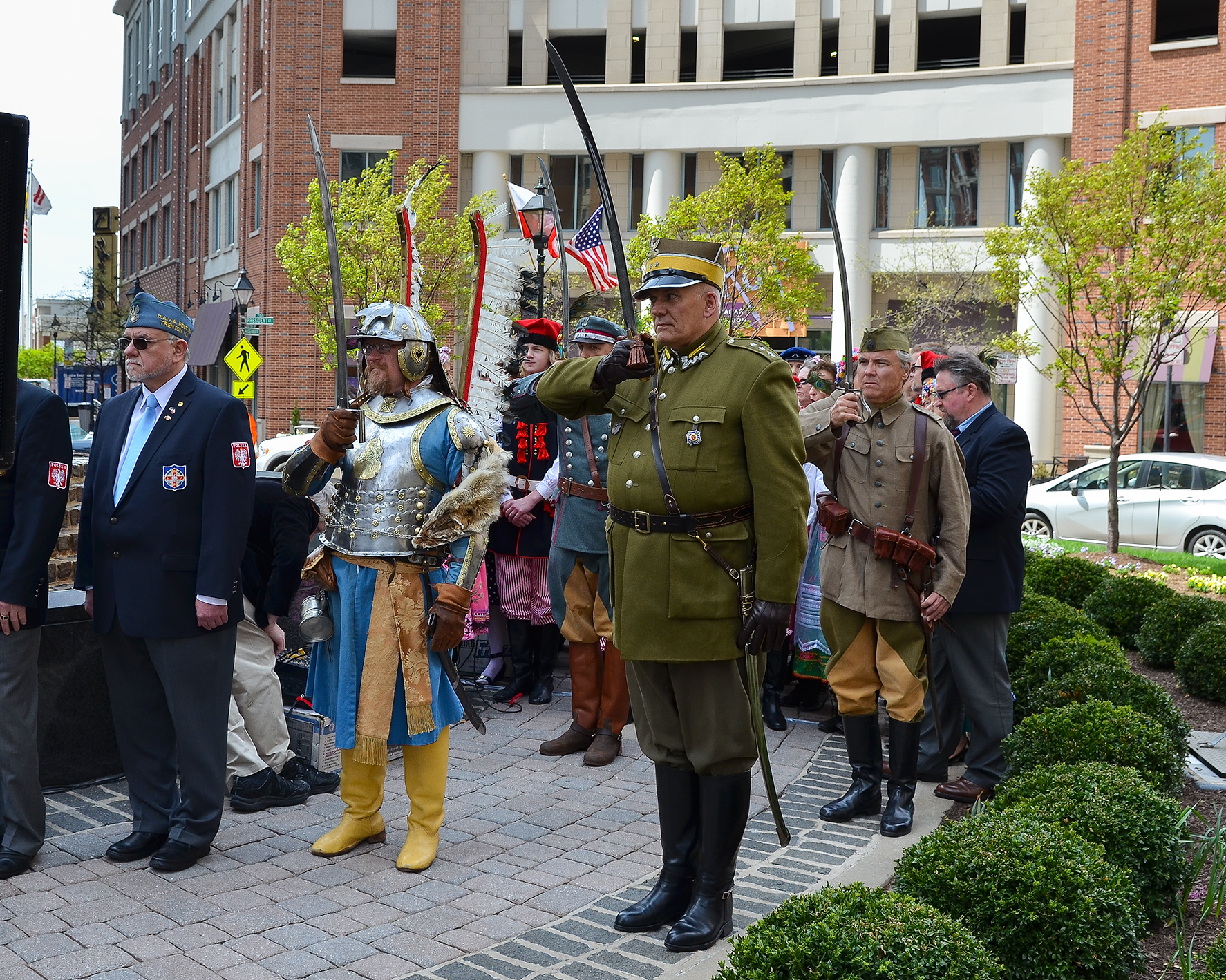17th Remembrance of the Katyń Martyrs
Speaking for Poland. Ambassador Piotr Wilczek is depicted at the base of the National Katyń Memorial addressing the large gathering of Polonia with its local and visiting organizations, Polish Army veterans, friends of Poland, and politicians on the city, state and federal levels.
By Richard Poremski, Washington, DC Bureau
Polish American Journal
May 12, 2017
BALTIMORE, Md. – Over 150 people assembled here at the National Katyń Memorial in the center of Harbor East at 1 PM on April 30, 2017 to memorialize the 22,000 Polish Army officers who were slain in the greater crime of Katyń. Many were reserve officers called to duty who represented Poland’s officialdom, leading citizens and intelligentsia, all murdered in the infamous April 1940 Katyń Forest Massacre at the bloodied hands of the Soviet Union’s (aka Russian) NKVD – militarized political police. This stark genocide to decapitate the leadership of Poland was also carried out at other such horrid locations during the early World War II timeframe.
The Remembrance Ceremony included color guards, Roman Catholic Church, Polish Nation Catholic Church and Jewish clergy in prayer and commentary, the Embassy of Poland, guest speakers, politicians, military officers, politicians, the laying of wreaths, and “Taps” played by a Maryland National Guard bugler. Earlier in the day at 10:30 AM a dedicated mass with Polish military flourishes was celebrated at Holy Rosary Church in Polish and English.
At the afternoon reception/dinner in the great Hall of the Polish National Alliance - Council 21, the 96 victims of the catastrophic April 10, 2010 Smolensk-Katyń airplane crash that claimed the lives of President Lech Kaczynski, his wife Maria, the Chiefs of the Armed Forces, esteemed clergy, prominent government officials, eminent members of the parliament, notable institutional leaders and honored citizens were all remembered. Ambassador Piotr Wilczek and Brigadier General Cezary Wisniewski both took part in a special candle lighting ceremony honoring the deceased.
Follows is the encapsulated remarks of the featured Remembrance speakers:
Mayor Catherine Pugh: Welcomed everyone to Baltimore City, and said “The Katyń Memorial has become a great symbol for Baltimore City and a place to share our memories and to never forget our past. We must remember all who served before us and suffered as well. This Memorial stands as a reminder of the sacrifice of so many.” The mayor was also impressed with the all the young people participating so that they can share and carry this memory and their shared memories into the future.
Ambassador Piotr Wilczek: Was very impressed that “This monument is proudly located in the center of the city. The Katyń Memorial is a symbol of of our Polish history and a proud symbol of Poland and Polish memory in Baltimore. Katyń is a very contentious issue between Poland and Russia, clouding our politics and relationship.” The Ambassador recounted how the crime of Katyń was severely suppressed during the time of Poland’s communist domination causing only the most courageous of Poles to broach the then-dangerous subject. “Other Katyńs do exist do exist and much more has to be done to discover and document them in the future.”
Brigadier General Cezary Wisniewski: The Defense Attaché recounted the Genocide of Katyń - and at other such identified locations – emphasizing the suppression of the crime by the perpetrating Soviets (Russians). “The Katyń Forest Massacre has served to make Poland’s military even stronger because of the victims of this genocide who were sacrificed on the altar of freedom.”
Zeke Cohen: The Baltimore City Councilman intoned that “We stand together to remember the Katyń Massacre. It is important to remember – and never forget – that what happened in those woods (Katyń Forest) was nothing less than cold blooded murder. Their bodies were desecrated and buried in mass graves. Our act of remembrance lifts up the brave men who marched to their doom. What makes us human is that we remember and memorialize.”
“This monument is an important part of our city because it forces us to stare into the darkness and light. It reminds me of the Holocaust in which my family members perished, and whose bodies were discarded like the men of Katyń were.” Cohen then spoke poignantly of a letter, containing a survival gold coin memento that he treasures from his great grandmother who suffered and did survive the Holocaust at the hands of the Nazi Germans. “My family members who perished in the Holocaust are up there in Heaven with the men of the Katyń Massacre staring down on us … and so we say Never Again. Never Again to genocide wherever it exists in the world, to Sarin gas in Syria, to starvation in Somalia. We are all in this together.”
The groups participating in the ceremonies were: Polish Legion of American Veterans – Maryland Department, Polish Army Veteran of America (“SWAP”) – Post 36 and Post 81 from New Jersey, Baltimore’s costumed folk dance groups Kkakowiaki (youth) and Ojczyzna (adult). Maryland U.S. Senators Ben Cardin and Chris Van Hollen were represented by their deputies.
On this reflective spring Sunday all who perished because of Katyń were commemorated … those in April 1940 by the hand of Josef Stalin’s Soviet Union. … and more recently those by the capricious Hand of Fate on April 10, 2010. ❑


